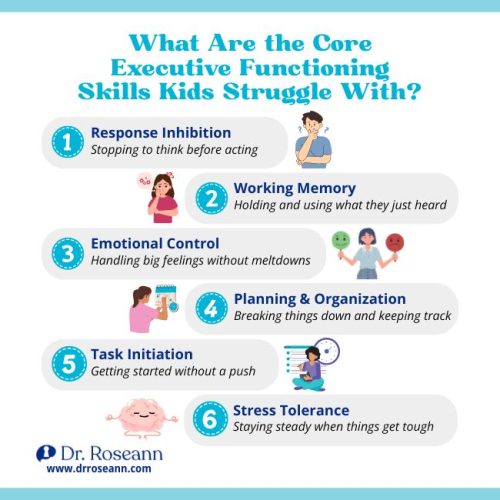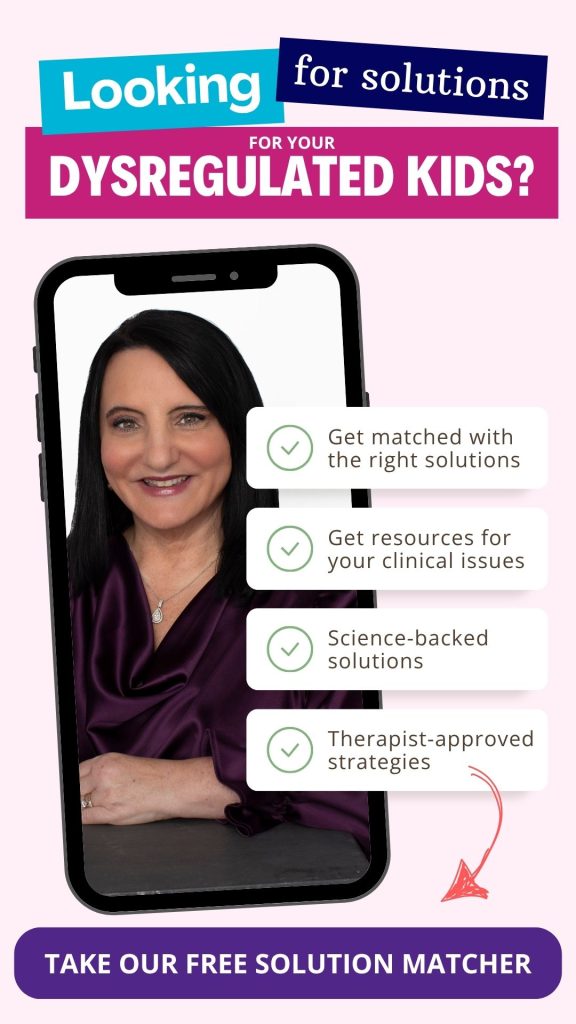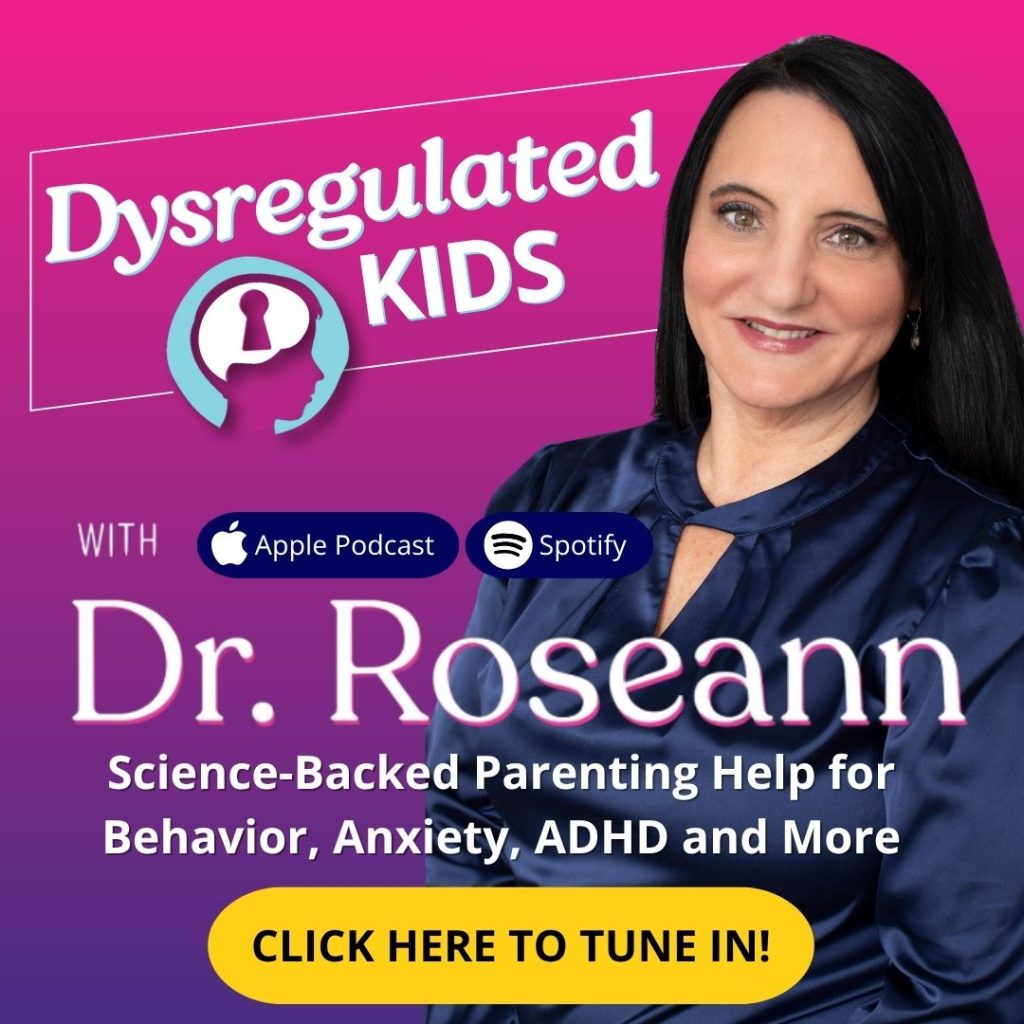Estimated reading time: 7 minutes
It’s tough to watch your bright child struggle with focus, follow-through, or big emotions—especially when they’re clearly trying.
These aren’t signs of laziness, but of a brain working overtime to cope.
What you’re seeing is often executive functioning challenges rooted in nervous system dysregulation. The good news? Neurofeedback helps calm the brain so your child can finally access the skills they already have—and feel more in control of their world.
What Is Executive Functioning and Why Does It Impact Daily Life So Much?
Executive functioning is like your child’s brain control center—it helps them manage thoughts, emotions, and actions to stay on track. When this system is off, even simple tasks—like getting dressed or starting homework—can feel overwhelming.
These skills help your child:
- Pause and think before acting
- Stay focused and complete tasks
- Manage frustration and big emotions
- Plan ahead and stay organized
Research by Bagheri and Hoseini (2024) highlights three essential cores of executive functioning:
- Working memory
- Cognitive flexibility
- Sustained attention
These brain skills aren’t just important for school—they’re key to:
- Building independence
- Managing friendships (Miller et al., 2020)
- Navigating daily life with more ease
What Are the Core Executive Functioning Skills Kids Struggle With?

Many kids who seem distracted, disorganized, or emotionally reactive are actually struggling with core executive functioning skills that help the brain plan, focus, and manage behavior.
These skills include their ability to:
- Think before acting
- Hold and use what they just heard
- Handle big feelings
- Break things down and keep track
- Initiate
- Stay relaxed when things get stressful
These brain skills don’t always grow on their own—especially in kids with:
- ADHD
- Anxiety
- Sensory processing challenges
That’s why tools like neurofeedback are game-changers.
It’s not magic—but when you calm the brain first, everything else gets easier.
How Can Neurofeedback Improve Executive Functioning?
Neurofeedback is a safe, non-invasive way to train the brain—especially the frontal lobe—to build healthier patterns and boost executive functioning over time.
Here’s how it can help kids who struggle with daily tasks:
- Supports task breakdown
- Reduces resistance
- Builds independence
- Improves emotional coping
Many parents say the shift is real. After a few sessions, their child starts showing up with more calm, more control—and the confidence to handle what used to feel impossible.
Who Can Benefit from Neurofeedback?
Besides executive functioning struggles, neurofeedback is especially helpful for kids and teens with:
- Executive functioning disorder
- ADHD symptoms
- High-functioning anxiety
- OCD
- Depression
- Sensory processing issues
- Gifted but scattered learners
- Autism Spectrum Disorder (ASD)
And the research backs it up—Pereira et al. (2024) found that neurofeedback improved brain regulation and attention in kids with ASD.
How Does Neurofeedback Work?
Ever wish your child could just get started without that daily tug-of-war? Or maybe you’re holding your breath, hoping today isn’t another meltdown over something small like the wrong color cup.
That’s where neurofeedback comes in. Here’s how it works:
- Brain Mapping (QEEG): Identifies dysregulated brainwave patterns.
- Custom Training Plan: Built around your child’s unique brain patterns and executive functioning needs.
- Brain Training Sessions: While your child watches a show or plays a game, sensors give real-time feedback that rewards healthy brain activity.
- Strengthens Self-Regulation: With consistent training, the brain builds better patterns that stick—improving focus, emotional control, and task completion.
This isn’t just theory—it’s brain science. It’s what I’ve seen over and over again with kids who come in scattered, stressed, and stuck… then start showing up calmer, more organized, and confident in ways their parents never imagined possible.
Read FULL GUIDE ON AT-HOME NEUROFEEDBACK: CALMING THE BRAIN AND SUPPORTING SELF-REGULATION
How Does the BrainBehaviorReset™ Program Support Executive Functioning?
When executive functioning is hard, daily tasks feel like uphill battles. It’s not that your child isn’t trying—their brain just isn’t working efficiently yet.
That’s where the BrainBehaviorReset™ Program comes in. It calms the brain first, so real progress can finally take root.
Here’s what’s included:
1. Neurofeedback Therapy
Trains the brain to self-regulate—improving focus, flexibility, and follow-through without medication.
2. Executive Function Coaching
Teaches practical strategies—like breaking tasks into steps or setting up visual reminders that work.
3. Parent Coaching
Helps you support your child without doing everything for them—so they grow more independent and confident.
Let’s regulate your child’s brain and start restoring their calm.
Ready to Help Your Child Feel More in Control?
If you’re exhausted from the daily battles over homework, hygiene, and getting out the door—know this: you’re not the only one. I hear it all the time from parents who say, “We’ve tried everything—planners, timers, rewards… nothing sticks.”
The truth? It’s not a motivation problem; it’s a brain regulation problem. And when we calm the brain first, everything starts to shift.
That’s what executive functioning is all about—teaching the brain how to run the show. When kids get support that works with their brain instead of against it, here’s what happens:
- They build confidence. They stop saying “I can’t” and start showing up with “I’ve got this.”
- Focus and follow-through improve. Tasks get done—without constant prompting.
- Independence grows. You stop being the human reminder system and start being Mom or Dad again.
- Daily routines smooth out. Mornings, homework, and even bedtime don’t feel like battlegrounds.
- You see your child thrive. Not just with school, but in how they feel about themselves.
That’s the kind of transformation we see every day with the BrainBehaviorReset™ Program—because we calm the brain first, then layer in executive functioning skills and real-life strategies that actually stick.
You don’t have to figure this out on your own anymore. Let’s talk about how to help your child feel calm, confident, and in control—starting with their brain.
What Is Executive Functioning and Why Does It Matter?
Think of executive functioning as your child’s brain control center that ensures that everything is in order. It is responsible for managing thoughts, emotions, and actions to reach goals.
Executive functioning helps your child:
- Stop and think before acting impulsively
- Stay focused on tasks
- Manage frustration and emotions
- Plan ahead and organize tasks independently
According to Bagheri and Hoseini (2024), some of the essential components of executive functioning include skills like working memory, cognitive flexibility, and sustained attention which are vital for your child’s success in school, forming friendships, and becoming more independent.
Key Executive Functioning Skills Include:
Response Inhibition: Thinking before acting—like raising a hand instead of blurting or not grabbing a toy.
Working Memory: Remembering and following multi-step directions to complete a task.
Emotional Control: Managing anxiety or frustration with healthy coping mechanisms, like deep breaths instead of meltdowns.
Planning and Organization: Breaking tasks into logical steps and keeping track of materials.
Task Initiation: Starting tasks without constant reminders.
Stress Tolerance: Staying calm under pressure or when things get tough.
These skills don’t always develop naturally—especially if your child struggles with attention issues, anxiety, or other challenges that affect focus and self-regulation.
Parent Action Steps
FAQs
Is neurofeedback safe for children?
Yes, neurofeedback is a safe, non-invasive, and drug-free tool that’s been used with kids for decades. It simply gives the brain feedback in real-time to help reinforce healthier patterns.
There’s no electrical stimulation involved—just gentle, consistent training that helps the brain work better.
Why is calming the brain so important for executive functioning?
When the brain is stuck in “fight, flight, or freeze” mode, executive functioning skills like focus or organization just don’t stick. Neurofeedback calms those stress patterns so the brain can finally access the tools it already has.
We regulate first—then real progress begins.
How long does it take to see results?
Every child is different, but many families start seeing subtle shifts—like better mood, fewer meltdowns, or improved focus—within a few weeks. Long-lasting changes typically build over 20 to 40 sessions, depending on the child’s unique brain patterns and needs.
Citations:
Miller, S. E., Avila, B. N., & Reavis, R. D. (2020). Thoughtful Friends: Executive Function Relates to Social Problem Solving and Friendship Quality in Middle Childhood. The Journal of Genetic Psychology, 181(2–3), 78–94. https://doi.org/10.1080/00221325.2020.1719024
Pereira, D.J., Morais, S., Sayal, A. et al. Neurofeedback training of executive function in autism spectrum disorder: distinct effects on brain activity levels and compensatory connectivity changes. J Neurodevelop Disord 16, 14 (2024). https://doi.org/10.1186/s11689-024-09531-2
Bagheri, S., & Hoseini, B. M. (2024). The Effect of Neurofeedback Training on Improving Executive Functions in Student Athletes: The effect of neurofeedback training on improving executive functions. International Journal of Body, Mind and Culture, 11(5), 620–636. https://doi.org/10.22122/ijbmc.v11i5.801
Dr. Roseann is a mental health expert in neurofeedback who frequently is in the media:
- The Holistic Counseling Podcast Therapist’s Integrative Tools: Neurofeedback and Biofeedback
- Life’s Essential Ingredients Connecting at the Root
- It’s Gonna Be OK! With Dr. Roseann Podcast: Neurofeedback Series
- Mel Robbins Show: Neurofeedback
- Clearly Clinical Podcast: Neurofeedback
- Creative Clinician’s Corner: Neurofeedback
Always remember… “Calm Brain, Happy Family™”
Disclaimer: This article is not intended to give health advice and it is recommended to consult with a physician before beginning any new wellness regime. *The effectiveness of diagnosis and treatment vary by patient and condition. Dr. Roseann Capanna-Hodge, LLC does not guarantee certain results.
Are you looking for SOLUTIONS for your struggling child or teen?
Dr. Roseann and her team are all about science-backed solutions, so you are in the right place!
Apply to work with Dr. Roseann below










